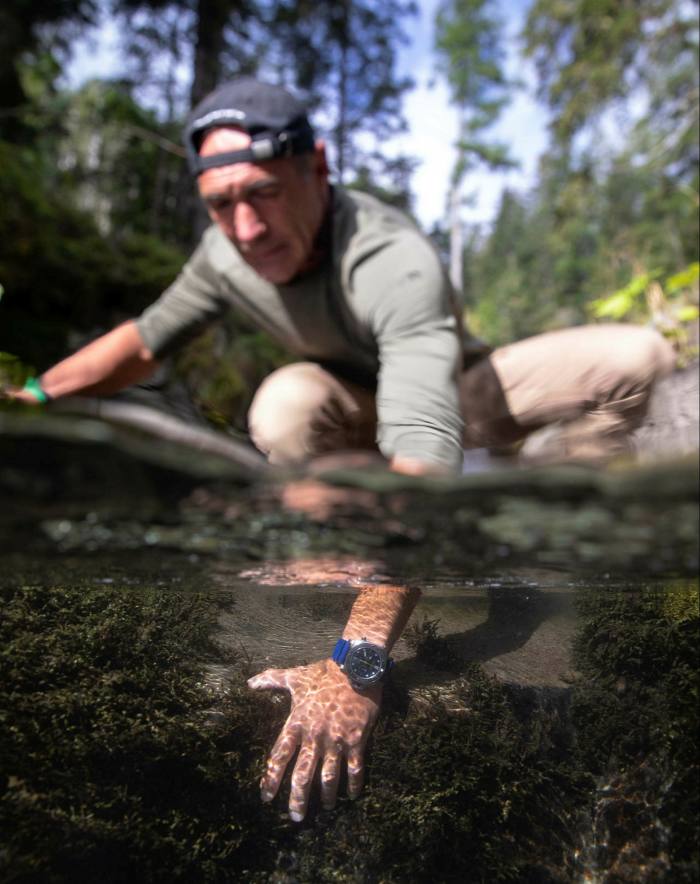[ad_1]
Luxury watch companies have made a big play of partnerships with leading conservation agencies. Hublot is helping to save the rhino. And Omega is trying to protect the oceans, as well as clearing up space junk. Close ties to non-profits have a positive effect on consumers — and the bottom line. Being good is good for business.
Research published by consultancy Accenture and the World Economic Forum in September found that 66 per cent of consumers were planning to make “more sustainable/ethical purchases” over the following six months.
But pressure is growing on brands to come clean about their sponsorship deals with conservation charities. Accusations of companies making misleading claims about their environmental credentials — so-called greenwashing — are never far away.
The watch industry is a latecomer to green activities. In 2018, the charity WWF published a damning report indicating the Swiss watch industry fell short of environmental standards. Many brands had failed to declare their environmental impact or partnerships, the report said. It concluded the industry “does not meet good environmental standards” and had “a great responsibility . . . to generate a positive impact on society, nature and the economy”.
“Not to calculate and publicise your impact is so 1980s,” says Damian Oettli, head of markets at WWF Switzerland. “You just can’t do that any more. The whole industry is basically susceptible to greenwashing. Everybody wants to tell a wonderful story and then struggles to back it up.”
Four years on from the report, Oettli says the situation has not improved. “This industry was, and still is, 20 years behind industries that have been more exposed to environmental criticism,” he says. “Those companies supporting a charity here or there — this is where other industries started two decades ago. The true measure is how much they reduce their [environmental] impact.”
Industry analysts say watch brands need to catch up. “You can’t just care about business, you have to care about society and the environment,” says David Sadigh, founder of Geneva-based marketing agency Digital Luxury Group. “This will become even more important, because the pressure will come from investors and the stock market to be a good company.”
Brands understand the marketing power of environmental stories. Ulysse Nardin, for example, has made a great white shark a brand ambassador. “Let’s be transparent,” says Patrick Pruniaux, chief executive. “It gives us some storytelling behind some of the product.” He says his company’s annual contribution to its conservation partners is equivalent to a “couple of per cent” of its revenues, which are not disclosed. “Some contribution is better than no contribution,” he says. “What’s wrong is lying.”
Ulysse Nardin is not alone. Last year, Panerai entered into a partnership with Unesco’s Intergovernmental Oceanographic Commission. Panerai says it is donating €300,000 a year to fund an educational programme, starting next month, in which its representatives will go into more than 100 universities around the world to present “ocean literacy” materials created by the IOC. The donation will also fund the development of an online educational tool connecting teachers and students to ocean conservation experts.
“We showed Panerai several options for collaboration and they went for the boldest one,” says Francesca Santoro, an IOC programme specialist. “They didn’t want a little project to show they were doing something good. They committed to providing support throughout the decade.” Panerai has become the only member from the private sector of the IOC’s Ocean Decade Alliance, which is made up of heads of state and leaders of philanthropic organisations.
Ideally, charities would prefer donations with no strings. “It’s relatively easy to get restricted funding,” says Guy Stevens, founder and chief executive of the Manta Trust, a small UK charity supported by family-owned Swiss watch company Carl F Bucherer. “But no one wants to give you money to run a charity.”
However, the trust and the watchmaker first came together in 2012 and, over the past decade, Stevens says the Swiss brand has donated “hundreds of thousands of Swiss francs” for the charity to use as it sees fit. Stevens says funds from Carl F Bucherer provide about 10 per cent of his annual running costs.
“It’s sometimes very important to support a specific project for communication,” admits Sascha Moeri, Carl F Bucherer’s chief executive. “But we also need to give Guy the liberty [to use funds] and to trust him.”
Some non-profits say the value of piggybacking brands’ kudos and communications strategies can often outweigh the financial benefits.
“Our partnership with Oris has given us a lot of credibility on the international stage,” says Martha Roesler, chief development officer at the Florida-based Coral Restoration Foundation. “It’s helped us grow and attract other corporate sponsors. That’s been invaluable.” Oris has also made limited-edition watches that name-check the foundation, some of which have been sold at charity auctions, so far raising more than $25,000, according to Roesler.
The beauty of the watch industry is that it is small but has a voice, says Jean-Marc Pontroué, Panerai chief executive. “When I speak with Unesco, I tell them to use us as a platform for their communication,” he says.
Even so, questions persist about the value of these partnerships. “Supporting conservation activities is always good,” says the WWF’s Oettli. “But it’s not these brands’ first responsibility. [That] lies in cleaning up their act and making their businesses as impact-less as possible.”

Some brands appear to agree. Last year, Oris announced it had been certified as climate-neutral by ClimatePartner, an environmental consultancy, having paid to offset its global carbon emissions. “Watch brands have a higher responsibility to make as little impact on the environment as possible, because we make a product that you don’t really need,” says Rolf Studer, Oris co-chief executive. “We’re not supplying food. When you talk about being responsible and then use it to market products, you need to be held accountable.”
Studer says it took Oris two years to calculate its carbon footprint and it has begun a three-year programme to reduce its emissions through schemes to collect solar energy and limit international flights. Oris will publish its first sustainability report at the end of March at the Watches and Wonders Geneva watch fair. “A sustainability report is normally an indicator a company is behaving well,” says Oettli. “Other watch companies don’t have a sustainability report.”
There is a problem of consistency, though. Some brands have partnerships that promote sustainability and others that seem to go against it. Sadigh of DLG says that, as Chinese consumers become more environmentally conscious, the industry will have to redress the balance or risk losing customers. “You can find companies doing amazing things to conserve the ocean, but they’re also sponsoring Formula One, subsidising an industry that has a negative impact on the environment and encourages people to drive,” he says. “Brands will have to correct those contradictions.”
Climate Capital

Where climate change meets business, markets and politics. Explore the FT’s coverage here.
Are you curious about the FT’s environmental sustainability commitments? Find out more about our science-based targets here
Others say the problem runs deeper. “You can’t just pretend to be greener by using a recycled material if it has to be transported all over the planet,” says Oliver Müller, founder of Swiss consultancy LuxeConsult. “The effort must be aligned. For instance, using vegan leathers and claiming you made the world a better place, and at the same time continuing to use private jets for your executives, doesn’t make much sense.”
The question of trust remains. Some watch brand chief executives have said the risks of not being able to prove claims of environmentally responsible behaviour are too great. Social media have made it all but impossible to control a bad news story. “If you are caught not doing, or exaggerating what you said you were doing, that will be a lack of credibility for years,” says Pontroué.
Watch companies will therefore continue to invest in conservation. Oettli says that, while he feels the industry is still stuck in the past, there are positives. “Few [watch] companies had sustainability set-ups, but now we see professionalisation and [brands] building up teams to look at sustainability.”
Some argue that the watch industry will be nothing without such measures. “There are no brands on a dead planet,” points out Roesler of the Coral Restoration Foundation.
[ad_2]
Source link



